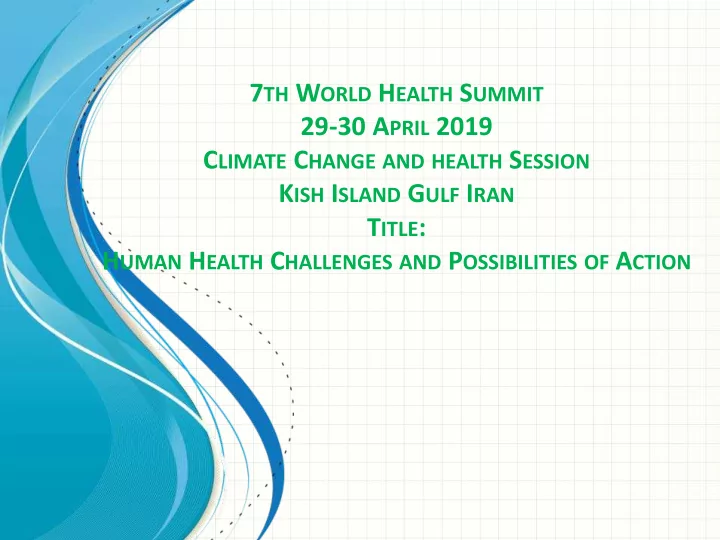

7 TH W ORLD H EALTH S UMMIT 29-30 A PRIL 2019 C LIMATE C HANGE AND HEALTH S ESSION K ISH I SLAND G ULF I RAN T ITLE : H UMAN H EALTH C HALLENGES AND P OSSIBILITIES OF A CTION
• The International Community become aware that the health challenges due to climate change become critical preoccupation particularly on : - air and water quality, - soil degradation, - industrial pollution, - food quality and wellbeing scarcity.
• Beside the new advanced technology in medicine sciences, • Human health becomes more affected by ecological disruptions on the quantity and quality of crops, increase on diseases vectors, displacement and migration of populations due to climate change extreme events as floods and drought, under nutrition and social conflicts on limited natural resources.
• Following the IPCC reports, it is foreseen that climate change will act mainly by exacerbating health problems that already exist, • New conditions could emerge, • Some existing diseases may extend their range into areas that are actually unaffected, • The largest risks related to health losses due to under nutrition will occur mainly in areas that already are food-insecure.
• The IPCC scenarios highlights that major changes will occur through: • Greater risk of injury, disease , and death due to more intense heat waves and fires • Increased risk of under nutrition resulting from diminished food production in poor regions • Consequences for health of lost work capacity and reduced labor productivity in vulnerable populations
• Accelerating public health and medical interventions is highly recommended to reduce the present burden of disease, • This could alleviate and increase resilience to reduce the climate change impacts on health • Increased risks of food- and water-borne diseases and vector borne diseases
Priority interventions include: • - improved management of the environmental determinants of health (such as provision of water and sanitation), - infectious disease surveillance, and strengthening the resilience of health systems to extreme weather events, - raise awareness and availability of healthy foods and lifestyle mentality, - Alleviation of poverty is also a necessary condition for successful adaptation.
Proposed programs Program that encourage “active transport” (walking and cycling) in • place of travel by motor vehicle reduce both CAP climate-altering pollutants emissions and offer direct health benefits. Reducing consumption of meat and dairy products may reduce • ischemic heart disease (assuming replacement with plant-based polyunsaturated) and some types of cancer. Program to provide access to reproductive health services for all • women will not only lead to slower population growth and its associated energy demands, but also will reduce the numbers of child and maternal deaths. All measures to reduce vulnerability in the near term improve • basic public health measures such as provision of clean water and sanitation, secure essential health care including vaccination and child health services, increase capacity for disaster preparedness and response, and alleviate poverty.
To conclude, I think it's a matter of changing human lifestyle mentality by : • Reducing local emissions of health-damaging and climate- altering air pollutants from energy systems, through improved energy efficiency, and a shift to cleaner energy sources and green economy • Providing access to reproductive health services (including modern family planning) to improve child and maternal health through birth spacing and reduce energy use, and consequent CAP emissions over time • Shifting consumption away from animal products, especially from ruminant sources, in high-meat-consumption societies toward less CAP intensive healthy diets
• Designing transport systems that promote active and clean transport and reduce use of motorized vehicles, leading to lower emissions of CAPs and better health through improved air quality and greater physical activity . • Promoting research on the health consequences of climate change and co-benefits actions, particularly in low- income countries • Investigate how climate change affects the most vulnerable populations. • Identify the health implications of adaptation measures at local community and national levels. • Promote awareness about interest and how taking health co-benefits from bio healthy foods and products from beekeeping, medicinal plants , etc.
مﻛﻣﺎﻣﺗھا نﺳﺣ ﻰﻠﻋ ارﻛﺷ زا ﺎﻣﺷ ﮫﺟوﺗمرﻛﺷﺗﻣ Thank anks for for your our attention ion Me Merci rci p pour vo r votre re at attention ALLALI Abdelkader allali05@yahoo.fr
Recommend
More recommend